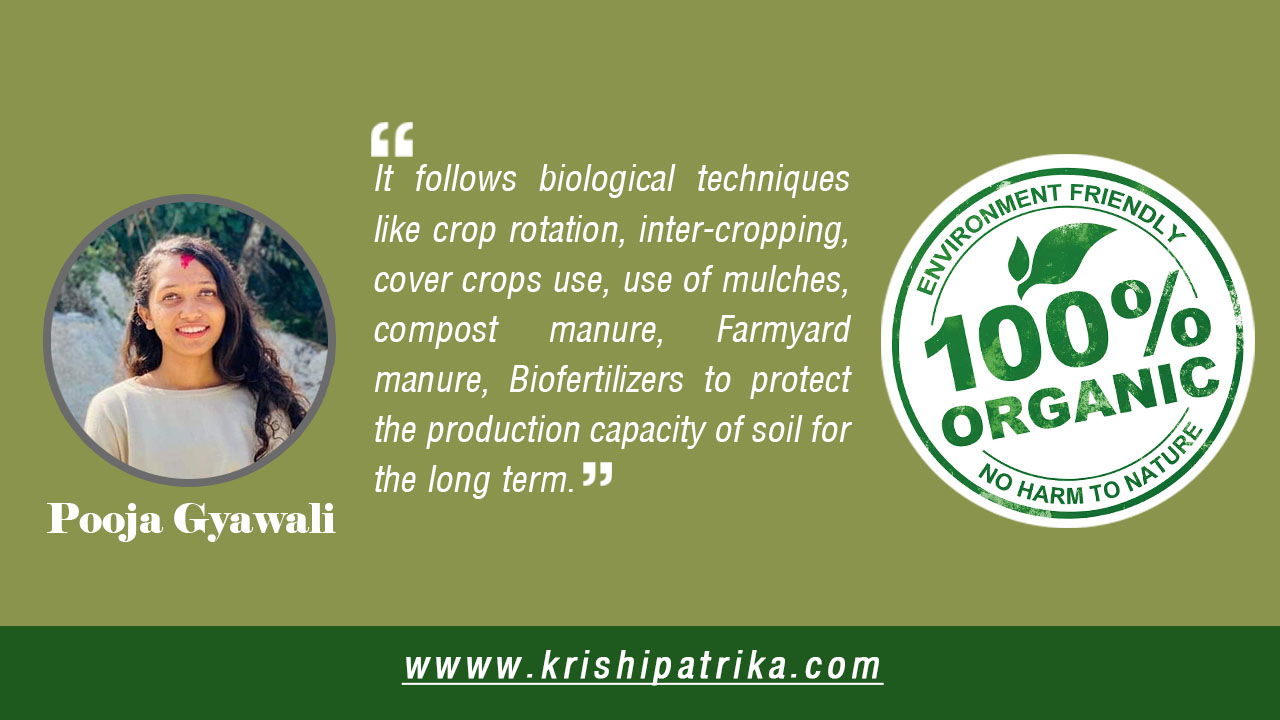
Around 60% of total population are engaged in agriculture in Nepal, where the country’s economy is dominated by agriculture. Subsistence type of farming where agricultural crops & livestock are integrated is seen in Nepal. Even though both organic and inorganic practices are followed. It is found that with the change in time, the organic traditional system of agriculture changes towards inorganic in Nepal, which is a direct threat to agricultural productivity, environmental quality and human health (Krishna P. Paudyal, 2010).
Organic Farming is the agricultural process of using environmentally friendly farming methods to improve soil health, to protect the environment and to ensure human health. No chemical fertilizer & pesticides or herbicides are allowed. It follows the biological techniques like crop rotation, inter-cropping, cover crops use, use of mulches, compost manure, Farm yard manure, Bio fertilizers to protect the production capacity of soil for long term. It includes :
- Use of alternative source of nutrient supply through crop rotation, residue management, organic manures for crop production.
- Management of weeds and pest by Biological control system. Example: Planting of certain plant and flowers that attracts biological predators, use of natural pesticide to fight against disease and pest.
- Maintenance of livestock with organic concept and make it an integral part of the entire system.
- Ensure biodiversity and sustainability of the system with the management of entire surrounding.
- Conversion of land from conventional management to organic management.
The consumption of organic food in the world is increasing, to prevent numerous health hazards that are caused by the residual effect of agrochemicals. Also the consumers level of awareness has been increasing towards the deleterious effects of agrochemical, the demand for organic food and vegetables has been increasing in the urban areas of Nepal and thus emphasizing the need of organic farming. The haphazard use of chemical fertilizers and pesticide has brought risk to health causing certain cancers, liver & kidney problems, hormone disruption, reproductive abnormalities, immune-suppression, birth defects. Organic products can reduce public health risk in all levels including Farm workers, their families and consumers by minimizing our exposure to toxic & persistent chemicals on the farm and in food, the soil in which we works and play, the air we breathe and the water we drink.
Organic farming holds out huge prospects in Nepal due to ecological diversities, higher labour availability in farming sector and exclusion of costly agrochemicals. The traditional farming knowledge & skill give the positive point for promoting organic agriculture in Nepal. National level committees are also formed for boosting organic farming in Nepal : NOAAB (National Organic Agriculture Accreditation Body) which accredits & certifies organic products, NCCOAPPS (National Coordination Committee for Organic Agriculture Production and Processing System) which helps in strengthening production & processing of organic products. It is estimated that 0.2 % of total agricultural land area has been certified as organic until 2013. The organic agriculture promotes the cultivation of local fruits & vegetables, tea, coffee, cardamom, ginger, honey & herbal products that play a vital role in fighting poverty and food insecurity in the hills and mountains of Nepal. Extension of organic farming is needed by providing subsidy to farmers and awaring & ensuring them about organic practices and its importance.
Thus, the health benefits of organic products have increased the willingness of consumer to pay for organic product. It also has benefits in terms of environmental protection, conservation of non-renewable resources, improves food quality and ensure food security, reduction in output of surplus product and reorientation of agriculture towards areas of market demand. So, the roles of government, private sectors, individual farmers and consumers are equally important for the sustainability of organic agriculture with the aim of creating healthy environment, healthy food and thus healthy life.









